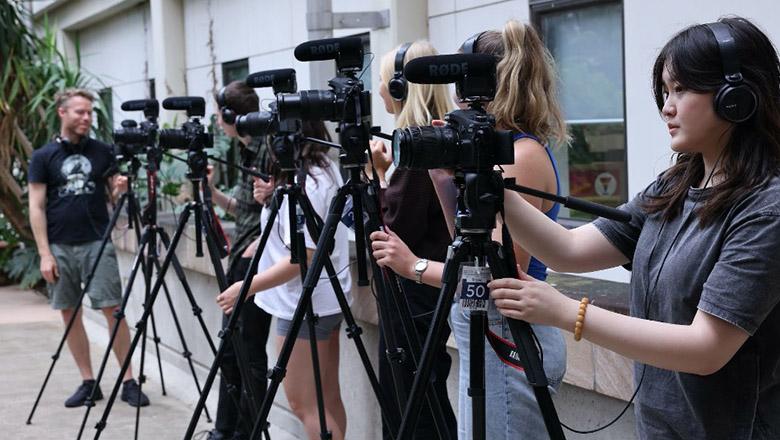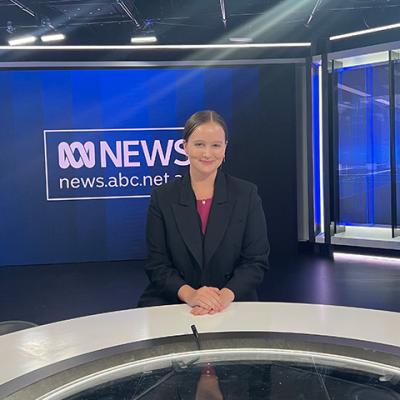Journalism is changing. Particularly against an ever-evolving media environment, where democracies are shifting and media is modernising society. Here at UQ, we understand that change is a good thing nonetheless.
The meaning of working in journalism has become increasingly diversified and more tricky to define with the ongoing shift in media globalisation and the growth of new and exciting technologies.
So, in a day and age where everyone can be a citizen journalist, what exactly can studying journalism do for society?
- Fill an important role as a gatekeeper to information and hold accountability to those in power.
- Inform the public about issues that are important to them.
- Report news stories about complex issues in a manner that is easily understandable, clear and informative.
- Ensure that truth and accuracy remains at the forefront of news.
Got you hooked? Let’s take a closer look at what you can do with a journalism degree and answer that important question: are journalism degrees worth it? We’ll iron out some conspiracy creases along the way with the help of UQ Bachelor of Journalism students, teachers and recent graduates who are forging their way forward in their current careers.
Why study journalism?
We’re sure you’ve heard the theories that journalism is in a period of ongoing change. The industry is questioned in its importance in media and news production, particularly when many news outlets are opting to go online following COVID-19 to cater to an increasingly digitised audience. However, we’re hoping to show you how journalism degrees are indeed necessary in combatting the shifting media tides. Here’s why:
- learn from leading experts in the journalism industry, who share the same drive to tell meaningful stories with expert and nuance
- learn to understand the industry, its history and what powers inform it, whilst accounting for the importance of empathy and ethics
- participate in valuable industry experiences from enrolment to graduation, ranging from first-year bootcamps to internships, field trips and work experience
- ability to combine a Bachelor of Journalism with a variety of programs in a dual degree format.
Let’s now break down the benefits of a journalism degree in detail.

Preparing you for any future
It’s understandable that many forces of change have ultimately reshaped the nature of journalism work.
- Journalists now need to be proficient in their use of social media, online publishing and multimedia, as well as traditional newsroom skills of research, planning, and working under pressure.
- The industry continues to change, particularly with media trust, the ongoing circulation of fake news and misinformation.
- Many new careers and job pathways continue to be created, with the rise of blogger, data, and user-based journalism opening as key routes for career development.
- Technology and social media are forces of change driving how and where news is produced and consumed, with the downsizing of newsrooms happening worldwide.
So how do you, as a future journalism student, react to that?
Bachelor of Journalism Convenor Dr Richard Murray believes that despite the changes, journalism is surfing the tide of an everchanging media environment.
“It’s a full-time job keeping up with the changes day-to-day, but equally, there are stories for renewal, and we continue to find out what that means and apply that to the course,” he said.
“The Bachelor of Journalism is matching what is happening in industry and exceeds what is currently happening with our connection to industry.
“Digital is becoming everything in this course. So being able to draw upon the broader resources of communications and arts, including the Media and Production Support (MaPS) team, that places us at the cutting edge of what digital is and transferring that knowledge to our students,” he said.
Richard explains that as modern journalists need to have a wide array of media and production skills under their belt, the range of careers available to students following their graduation is increasingly broadening.
“The idea that a journalist is going to be off doing just the one thing is simply not true.
“By teaching our students how to write articles, produce audio and video, we’re building and instilling resilience in our future graduates and pulling them out of their comfort zones with exciting new tools and venues where journalism is taking place.”
“We as staff are looking at where journalism is going and what the potential is, and how to bring that potential and possibility into our teaching.”
Skills and attributes gained from the Bachelor of Journalism
Andrea, a current student studying a Bachelors of Communication / Journalism (majoring in Digital Media) believes the program has equipped her with a number of skills, not just with those of writing a good story.
“Our industry is dynamic and constantly evolving, and this program really challenges students to be inventive, to go beyond the everyday journalism article and create new ways of doing journalism,” she said.
“Throughout my degree, I’ve designed an app that functions as a sort of ‘Tinder’ for news while privileging the audience to build the story. I’ve produced video journalism on Brisbane’s vintage markets, and I’ve produced an audio package that takes a deep dive into the Mormon church.
“Looking at my portfolio, I’m surprised at the quality of the content I have been able to produce through studying at UQ, and the stories I’ve been able to tell.”
Andrea also points out the importance of the Bachelor of Journalism in understanding contextual factors for the degree, proving particularly useful against an ever-changing media backdrop.
“The journalism program doesn’t simply teach you how to write an article, but it asks you to understand the industry, its history and what powers inform it,” she said.
Did you know? The median weekly full-time earnings of an Australian journalist is $1,842, which is higher than the all jobs median of $1,697. (Australian Government, n.d.)
Journalism subjects with industry experience
Here at UQ, there are several journalism courses within the Bachelor of Journalism that focus on giving students industry experience.
Not only are students encouraged to attend a boot camp offered in their first year of study, organised by UQ’s Journalism and Communication Society (JACS), but they are offered work experience opportunities throughout their studies, whether through subjects or pursued externally.
Richard said the insurance offered by UQ isn’t limited to course work.
“If students want to go out and organise their own internship, they can and are encouraged to do so,” he said.
“We’re seeing more and more students taking advantage of that fantastic opportunity, where students approach me in our first-year classes and I’ll put them in touch with connections.”
Both Andrea and Luke – another UQ Journalism student, also studying a Bachelor of Laws (Honours) – have taken part in numerous internships, workshops and industry engagement offered by UQ and its associated journalism student society.
Luke commends the amount of opportunities available to UQ Journalism students. He singled out the technical workshops run by MaPS, the industry engagement available through academics and society, and the freelance opportunities within the UQ community through societies, sporting events and community radio.
“I’ve done journalism-related internships at 4ZZZ Radio, UQLife, and Phillips Group Communications through societies and word of mouth from other journalism students.
“I was lucky enough to get an internship last year with Nine’s A Current Affair, and now I am currently working part-time as an associate producer for the program.”
Andrea points out that while students can pursue internships and work experience individually, the program also allows you to undertake an internship course and a field trip course that contributes to the degree.
“It’s a fantastic way to make connections while gaining industry experience, without overwhelming your workload,” she said.
“I have also gained industry experience by participating in a research project with the Student-Staff Partnerships team.”
Career opportunities in journalism
Ultimately, a degree in journalism doesn’t just have to result in a career as a journalist. Studying a Bachelor of Journalism at UQ can take you down a wide variety of career channels and trajectories and prepare you for many jobs. Ranging from news gathering to management, journalism graduates have a vital toolkit of skills favoured by many employers.
Here's a snapshot of roles you could find yourself in after graduating with a journalism degree:
- news gatherer and reporter
- print, radio, and TV news journalist
- presenter
- copywriter
- editor
- producer
- publisher
- magazine and newspaper writer or editor
- website and social media content creator or manager
- social media manager
- investigative reporter
- broadcast journalist
- media relations specialist.
And here are the top sectors in which journalism graduates find employment:
- information media and telecommunications
- professional, scientific, and technical services
- arts and recreation services
- public administration and safety.
Particularly in the near future, such sectors are forecast to experience significant growth.
Did you know? More than 59% of subscription and advertising-focused news organisations in a sample survey conducted by the Reuters Institute say that overall revenues have increased (Newman, 2022).
Meet Scout - a journalist and reporter for ABC News
Scout graduated from UQ with a Bachelors of Communication / Journalism in 2022. She’s now working as a journalist and reporter for ABC News, Australia’s public news service produced by the Australian Broadcasting Corporation.
Scout explains that as a reporter, she covers multiple platforms including TV, radio, digital and social media. Her job entails dealing with breaking news and pitching and working original stories. So far, she has covered issues such as welfare payments and the trajectory of the Brisbane music scene.
In terms of her daily responsibilities and skills needed for the job, Scout says that having the confidence to approach potential sources on the street, accompanied by a microphone and camera operator, is key in having the self-assurance of being a news expert. She also points out that future journalism students don’t have to be extroverted to thrive in the field.
“It’s really important to have good and creative writing skills, and some of the most brilliant journalists are introverted, quiet people,” she said.
“You don’t have to be a loud, outgoing person to be a journalist, it’s just being dedicated to your craft and to your talent and to your stories.”
When talking about what type of students would enjoy the program, Scout explains that creativity is at the heart of the journalism industry.
“The thing that really binds us all together is that we’re storytellers.
“I keep the people of Australia informed and keep them entertained and connected with communities, and they provide a lens into other communities they’re not a part of.
“If you want to be a journalist, you have that inherent drive as it’s a tough industry to crack,” she said.
Should I study journalism?
Still on the fence about whether you’d enjoy a journalism degree? Luke says it’s a program perfect for future students who are naturally interested in others, with an inquisitive mind.
“This degree allows you to ask any questions you’d like to any group in society, without the fear of judgement!
“As the study mode is very intimate and tutorials are often small, this allows you a chance to really engage with your tutor and pick their brains over ways to approach stories, or technical tips.”
Andrea said that, as the marriage between storytelling and meaning-making, journalism is best for those who maintain the desire to make the world a better place.
“Journalism really is a calling; when I first started my degree, I didn’t digest the news, nor consider myself a political person. I just had a drive to make a positive impact through storytelling.”
If you studied any subjects at school relating to English, English Extension, Humanities, or Drama, then the Bachelor of Journalism at UQ is for you.
Richard too points out that future students who are fundamentally curious will thrive in the program.
“It’s ideal for students who have an innate curiosity, no matter what background they come from or where they were born,” he said.
“Ultimately, people who can look at the world around them and start asking ‘why’; as annoying as that can be, people who want to develop a unique and valuable skillset in asking ‘why’ in sophisticated ways has tremendous value.”
So, is studying journalism worth it?
In terms of the bigger picture, Richard also makes a very important point for anyone considering studying a degree in journalism. It’s about building an extra layer of resilience; a key characteristic that will be with all journalism students and graduates, regardless of the career path they choose to embark on.
“By pulling people out of their comfort zone and encouraging them to conduct their interviews and find stories in cafes under trees and in cars as opposed to the centralised newsroom, it’s teaching students from all backgrounds how to become self-reliant from a skills perspective and a physical and mental perspective,” he said.
Richard goes on to ponder how the use of technology could impact the journalism industry and current job pool for graduates and future students.
“There’s so much being said about technology being a deviant, but the conversations I’ve been having with my peers suggests that it is a tool to help organise our ideas and thoughts; our work as journalists remains profoundly human and there’s still humanity in our work.”
So yes, studying journalism at UQ continues to change. But it’s changing for the good.









